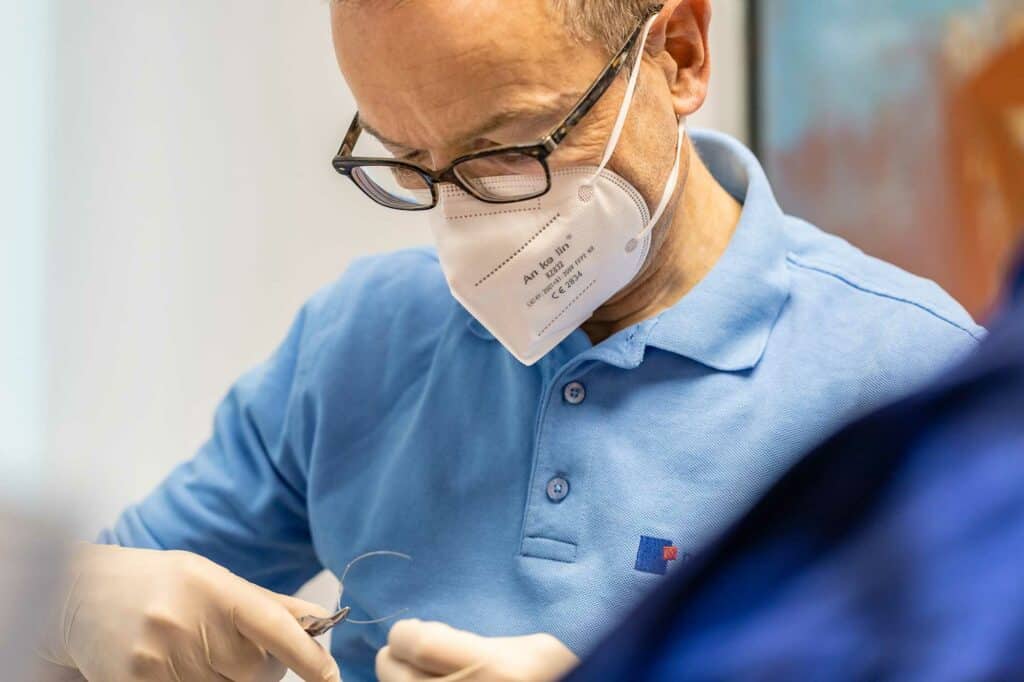Orthodontic education in Germany
Orthodontists are specialized dentists in orthodontics. Unfortunately in Germany, they have two different job titles: either “orthodontist” or “dentist for orthodontics.” Orthodontists graduate in dentistry which takes five and a half years. After that and before beginning postgraduate education, a one year occupation as general dentist is mandatory in most federal states. The postgraduate education in orthodontics takes three years. These three years can be completed at the orthodontic department of a university hospital of dentistry, but two of these three years can either be spent at an orthodontic office authorized to have postgraduate students. For this reason, the university education is reduced in most cases to the so called “clinic year.” This differs to the system of most other countries because orthodontists are usually being trained at a university hospital for three years. As the educating offices are hardly subjects to control and many German university hospitals train unsystematically, the German education is to be rated rather poor compared to international standards.
During orthodontist training, many patient treatments should usually be performed and completed under the supervision of instructors. In fact, the orthodontic departments of German university hospitals often have yawning emptiness in the training of specialist dentists, so that little is being done there.
Moreover, some federal states proceed to abolish the last bit of university education, i.e. the “clinic year”. The educational level has to suffer for young colleagues receiving their specialty training exclusively in orthodontic offices. Poorly trained orthodontists, who can neither shine scientifically nor on patients, have always existed in Germany.
The training of specialists in orthodontics is indeed a good prerequisite, but no guarantee of a high professional level. Those who want to achieve a high standard as orthodontist have to invest a lot into courses, congresses and reading literature within the German educational system.

Master of Science (M.Sc.) in orthodontics
The hasty introduction of the Bologna-process – a unification of all university degrees in Europe – made it possible that different foreign private universities offer the Master of Science (M.Sc.) in orthodontics in Germany. Dentists can get this title by completing weekend courses and a small thesis in one to three years. Formally, three years of full-time education, as with the specialized dentist in orthodontics, weigh more – despite three years of education, there’s no guarantee for a good professional level.
When MSc students work in a well-managed orthodontic practice during their training and perform many qualified treatments, they can achieve as high a level of professionalism as the most qualified specialist dentists. In the final analysis, it is less a question of the formal training than of the contents conveyed and practical experience.
Young dentists who work in our practices are not hired as training assistants by German university hospitals anyway. For this reason, if our young colleagues would like to receive formal training in orthodontics, they have only the possibility to take part at a part-time degree course of the MSc in Orthodontics. We support these colleagues with in-depth basic scientific education, which is not even standard in university hospitals, an in-house teaching curriculum and the ability to adequately treat patients according to their own abilities. We promise: Those who work for us as Master of Science in Orthodontics, perform on the highest professional level!
Dentists with a ‘focus‘ on orthodontics
Every dentist is allowed to offer orthodontic services no matter whether or not special qualifications have been acquired. After some weekend courses and a few orthodontic treatments a dentist is allowed to practice as dentist ‘focusing’ on orthodontics. Unfortunately, patients confuse this designation with the term orthodontist, which can only be acquired after three years of full-time training. Only the orthodontist and with some luck the Master of Science in Orthodontics have completed this training and can rely on their knowledge in diagnostics and therapy acquired during the long years of education. A dentist who is making extra money with orthodontics is usually unable to reach a high level in this specialty. The confusion is completed when orthodontists call themselves “dentists for orthodontics” and the next door dentist’s office sign says “dentist – focus on orthodontics”. Just one small word makes the difference! Who knows for sure which one of them has got three years of specialized training and which one just did only some weekend courses?
